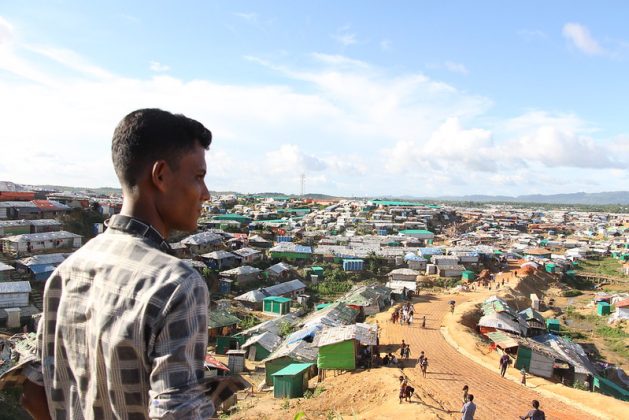The detection of the first coronavirus positive case in the Rohingya Refugee Camp in Bangladesh has been termed as a nightmare scenario and the government plus the UN and humanitarian agencies have been asked to take swift action to prevent and prepare for further spread. Senior Advocate for Human Rights of Refugees International Daniel P. Sullivan has in a statement also called for lifting the phone and Internet restrictions in the camps as lack of access to accurate information is fuelling misinformation in the camps
The statement reads: “The first positive case of COVID-19 in the Rohingya refugee camps in Bangladesh is the realization of a nightmare scenario. Home to nearly 900,000 Rohingya refugees, the population density of these camps is far higher than New York City. In addition, the prevalence of underlying health conditions among refugees and the deteriorating sanitary conditions sure to come with the looming monsoon and flooding season make for a witch’s brew of conditions in which the virus is sure to thrive. The government of Bangladesh, working with the UN and humanitarian agencies, must take swift action to prevent and prepare for further spread.
“The government of Bangladesh should immediately lift phone and internet restrictions in the camps that are holding back vital communications. The lack of access to accurate information is fueling misinformation, and rumours abound in the camps that COVID-19 is always fatal or that the faithful will be safe. Open communication is critical to promoting hygiene awareness and tracking the spread of the disease. Rohingya refugees must also be at the centre of the response. Bangladesh should empower Rohingya civil society who are already well placed to communicate life-saving information about COVID-19.
“Meanwhile, the medical resources necessary to respond will be strained by an already existing dearth of respirators and intensive care units across Bangladesh. Bangladesh authorities and UN agencies have been conducting health training, hygiene awareness campaigns, and planning further isolation sites. However, all of these activities need to be ramped up. Maintaining communications restrictions at this critical time will only unnecessarily further restrain these efforts.
“These essential first steps will not only help protect one of the world’s most vulnerable populations but will also serve as a frontline in the global battle to stop the virus.” – Press release, www.refugeesinternational.org
Meanwhile, In response to the news that two positive cases of COVID-19 have been discovered in the Rohingya refugee camps in Cox’s Bazar in Bangladesh today, Shah Dedar, Protection and Inclusion Adviser in HelpAge Bangladesh said:
“This raises alarm bells for older people given the risks they face from COVID-19. But given that almost one million people live together in such a small and crowded space, it is not an unexpected development.
We must do everything we can to prevent the number of positive COVID-19 cases spiralling out of control. It is now vital that the government and humanitarian agencies work together to step up testing facilities. There are currently no such facilities in the camps and the nearest one is 30km away. But we must TEST, TEST and TEST!
There are thousands of older people living in the camps, many of them suffer from hypertension, diabetes and cardiovascular and chronic respiratory diseases, which are exacerbated by the poor conditions they live in putting them dangerously at risk.
This could be a death sentence for too many people. We have been doing what we can to educate people about the dangers of the virus, but there is only so much we can do.
Given the greater risks older people face, they must be included and not discriminated against when developing a COVID-19 response in Cox’s Bazar.”




